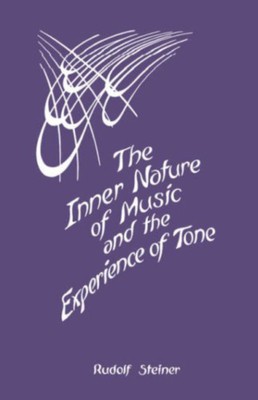
- We will send in 10–14 business days.
- Author: Rudolf Steiner
- Publisher: STEINER BOOKS
- ISBN-10: 0880100745
- ISBN-13: 9780880100748
- Format: 14 x 21.1 x 0.8 cm, minkšti viršeliai
- Language: English
- SAVE -10% with code: EXTRA
The Inner Nature of Music and the Experience of Tone (e-book) (used book) | bookbook.eu
Reviews
Description
7 lectures in various cities, December 3, 1906 - March 16, 1923 (CW 283)
"A tone is at the foundation of everything in the physical world."
This is one of many astonishing statements made by Rudolf Steiner in this collection of seven lectures on the inner realities of music. These lectures are an unusual treasure, since they are the only two groups of lectures that Steiner gave primarily on music, other than the lecture cycle for the tone eurythmy course, Eurythmy as Visible Music.
In the first group of three lectures, given in 1906, Steiner explains why music affects the human soul so powerfully. Music has always held a special position among the arts because it is the only art form whose archetype, or source, lies not in the physical world, as with architecture, sculpture, and painting, but purely in the spiritual world-the soul's true home. Music thus directly expresses through tones the innermost essence of the cosmos, and our sense of wellbeing when we hear music comes from a recognition of our soul's experience in the spiritual world.
In the remaining lectures, given in 1922 and 1923, Steiner discusses our experience of musical intervals and shows how it has undergone profound changes during the course of evolution. The religious effects of music in ancient times and the union of music with speech are considered, as well as the origin of musical instruments out of imaginations that accompanied singing. New insights are offered on the nature of the major and minor modes and on future directions of musical development.
This volume is a translation of 7 lectures (of 8) in Das Wesen des Musikalischen und das Tonerlebnis im Menschen (GA 283).
- Author: Rudolf Steiner
- Publisher: STEINER BOOKS
- ISBN-10: 0880100745
- ISBN-13: 9780880100748
- Format: 14 x 21.1 x 0.8 cm, minkšti viršeliai
- Language: English English
7 lectures in various cities, December 3, 1906 - March 16, 1923 (CW 283)
"A tone is at the foundation of everything in the physical world."
This is one of many astonishing statements made by Rudolf Steiner in this collection of seven lectures on the inner realities of music. These lectures are an unusual treasure, since they are the only two groups of lectures that Steiner gave primarily on music, other than the lecture cycle for the tone eurythmy course, Eurythmy as Visible Music.
In the first group of three lectures, given in 1906, Steiner explains why music affects the human soul so powerfully. Music has always held a special position among the arts because it is the only art form whose archetype, or source, lies not in the physical world, as with architecture, sculpture, and painting, but purely in the spiritual world-the soul's true home. Music thus directly expresses through tones the innermost essence of the cosmos, and our sense of wellbeing when we hear music comes from a recognition of our soul's experience in the spiritual world.
In the remaining lectures, given in 1922 and 1923, Steiner discusses our experience of musical intervals and shows how it has undergone profound changes during the course of evolution. The religious effects of music in ancient times and the union of music with speech are considered, as well as the origin of musical instruments out of imaginations that accompanied singing. New insights are offered on the nature of the major and minor modes and on future directions of musical development.
This volume is a translation of 7 lectures (of 8) in Das Wesen des Musikalischen und das Tonerlebnis im Menschen (GA 283).


Reviews